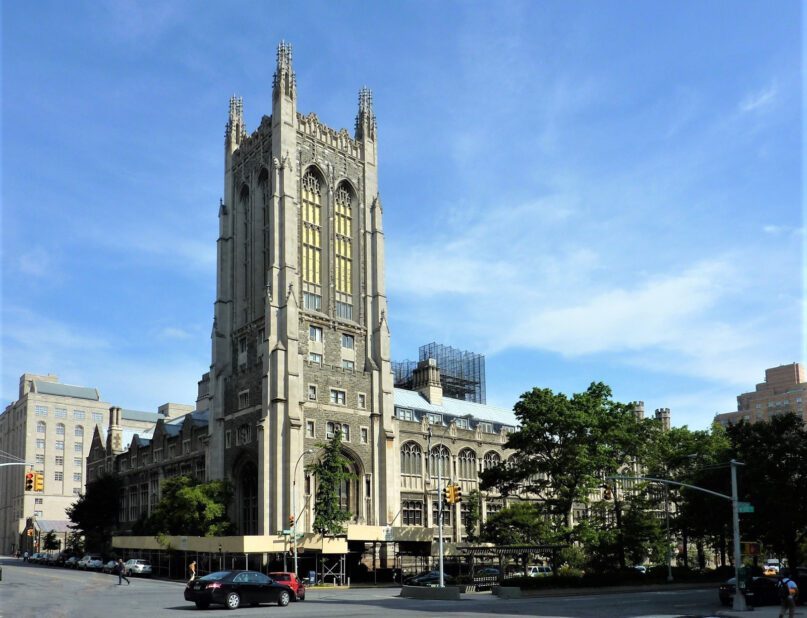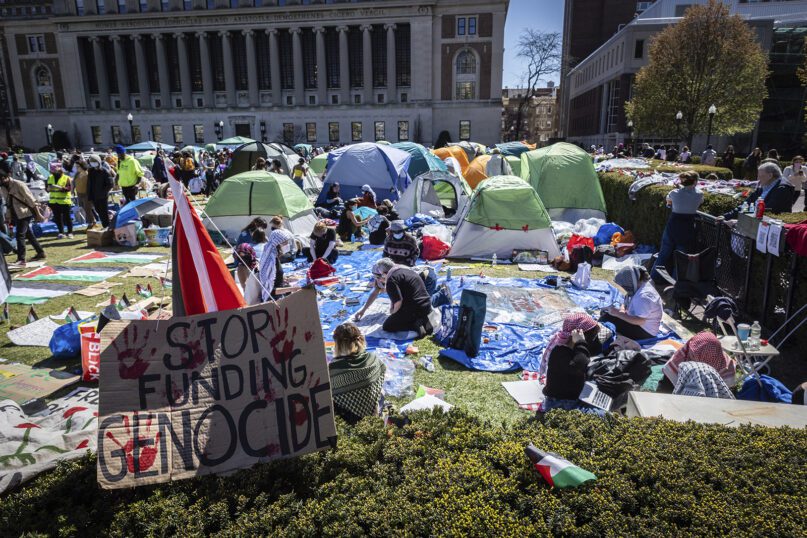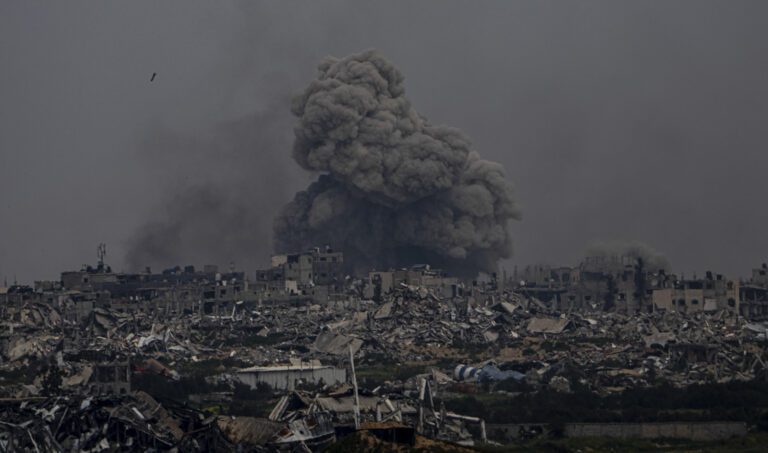Union, a private, ecumenical school that serves as Columbia University’s faculty of theology but maintains a separate endowment, is the first U.S. institute of higher education known to divest from the war in Gaza.
By Fiona Murphy
NEW YORK (RNS) — Union Theological Seminary’s board of trustees voted Thursday (May 9) to divest from all companies profiting off the war in Gaza.
Union, a private, ecumenical school, shares a graduate studies program with Columbia University but is independent and maintains a separate, $127 million endowment, is the first U.S. institute of higher education known to divest from the war in Gaza.
“We do it with humility and we do it with a sense of moral conviction,” said Union’s president, the Rev. Serene Jones.
In November, Union’s board of trustees, which includes Jones, hired Cambridge Associates, a private investment management company, to review the seminary’s investment portfolio to identify companies that are financially invested in the war in Gaza. The board will now transition to selling its shares of the identified companies.

“We have a very good investment committee who are completely, at a moral level, committed to seeing this through,” Jones said.
In a statement after the trustees had approved the measure, they said, “With respect to companies that are profiting from the present war in Palestine, we continue to
hold these standards high and have taken steps to identify all investments, both domestic and global, that support and profit from the present killing of innocent civilians in Palestine.”
Chris Marsicano, an assistant professor of educational studies and public policy at Davidson College, cautioned that divesting could take months, or even years, explaining that a single investment group can be invested in thousands of companies at one time. Additionally, the hedge funds that manage university endowments are constantly buying and selling shares and changing their investment strategy for the financial benefit of the institution, which makes an investigation difficult.
As a seminary, Union already screens its investments based on social and environmental principles.
“We don’t invest in any armaments or weapons,” Jones said. “It’s a small thing, but symbolically it’s an important step to take.”
“Although our investments in the war in Palestine are small because our previous, strong anti-armament screens are robust,” the trustees’ statement said, “we hope that our action today will bring needed pressure to bear to stop the killing and find a peaceful future for all.”
At Trinity College in Ireland, the school’s administration recently released a statement promising to “endeavour to divest” from Israeli companies after a five-day encampment led by student protesters caused conflict on campus. Student protesters in Ireland considered it only a partial victory as the university clarifies that divestment “will be considered by a task force as a first step.”
Calls for divestment have been a major demand of students participating in sit-ins and encampments at more than 100 colleges around the U.S. in protest of Israel’s response to Hamas’ terrorist attack and kidnapping on Oct. 7.
Union’s student body actively supported the dissenting Columbia students whose tents filled the university’s main quad in past weeks. Last month, a group of Union students hosted a Communion service in Columbia’s encampment attended by hundreds of people and held a small Passover Seder in Union’s courtyard for Jewish students suspended from Columbia.
“It felt like an ultimate integration of what I have learned at Union,” said Pearl Vercruysse, a third-year Master of Divinity student who participated in the Communion service, “and everything I’ve discerned as what I’m called to do in ministry.”
Credited with being the birthplace of liberation theology, Union has been a leading institution for progressive Christian activism for decades. Dietrich Bonhoeffer, German pastor executed by the Nazi regime, was briefly resident at Union, and the influential theologian Paul Tillich taught there for two decades. The controversial academic and current presidential candidate Cornel West has been associated with Union since the 1970s.

In 2014, Union trustees voted unanimously to divest from fossil fuels after a wave of student protests. Three months later, a group of students occupied a classroom to organize their demonstrations against the killing of Michael Brown by police in Ferguson, Missouri.
Known as the “Love Hub,” the classroom became a center for students and faculty protesting Brown’s death. James Cone, a Methodist minister and theologian who is considered the founder of Black liberation theology, delivered his last lecture in the Love Hub. After inviting the entire school, Cone spoke on the horrors of police violence, expanding on ideas from his 2011 book, “The Cross and the Lynching Tree.”
“The divestment happened just before I showed up, and was swiftly overshadowed by student activism around Ferguson,” said Jorge Rodriguez, a Union alumnus who now teaches history at the school.
In 1968, when students at Columbia created encampments to protest the Vietnam War, Union opened its door to students and faculty who were suspended and expelled. Union’s then-President John Bennett sided with the protesters, agreeing to cancel classes for the rest of the school year.
“After the cessation of classes, students created what they called the Free University,” Rodriguez said.
“In this moment,” Rodriguez said, “my hope is that we would see that same phenomena happen again.”
Union is currently hosting Columbia University professors who continue to teach students penalized for protesting the war in Gaza. Jones says these students are focused on completing their work so there is no reason, apart from violating a university policy for participating in an encampment, that they should not graduate.
In a letter to Columbia students published in April, Jones called the Union campus “a safe haven” for those penalized for taking part in the protests.
“As president, I have your back,” she wrote.

In the past month, as hundreds of students and other individuals have been arrested by the New York Police Department for protesting the war in Gaza, Jones said she has never seen this kind of “military action” taken from a university in all her career.
“I’ve never had to face this level of escalation,” Jones said. “I fear for our country.”
First published May 9, 2024



